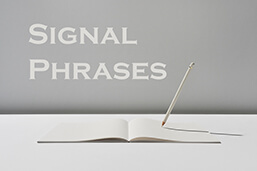
Signal phrases are essential components of academic writing, providing a seamless transition for citing sources and incorporating external information into one’s work. By skillfully integrating these phrases, writers can effectively acknowledge and attribute the ideas and evidence they draw from other authors, bolstering the credibility and reliability of their arguments. In this article, we discuss the purpose of signal phrases, how you can use them, and some examples you should be aware of.
Definition: Signal phrases
A signal phrase is a short expression that introduces a quote, paraphrase, or summary and indicates to readers that you’ve used an outside source.
Some general signal phrases include
- according to
- acknowledges or acknowledged
- adds or added
- addresses or addressed
- argues or argued
On the other hand, some common signal phrases that show opinion or uncertainty include:
- believes or believed
- cautions or cautioned
- claims or claimed
- endorses or endorsed
How to use signal phrases?
You often include relevant quotes or arguments in essays: Signal phrases are ideal for making vital introductions. Include them at the end, beginning, or middle of your sentence, varying how you use them to create a natural flow to your writing.
Effective use of signal phrases means that you should consider including the following:
- The reference’s name, i.e., a study or scholar(s)
- A distinctive tag like “has argued” or “asserts that”
- The idea or the quote itself
- The author’s credentials and title of the reference (option)
Remember to consider your word choice to avoid misinterpreting the author. The signal phrases you choose show the author’s standpoint.
For example, you could state that:
Instead of saying:
You can also use signal phrases to compare different arguments by using transition words like “however” or “although.”
Functions of signal phrases
Signal phrases can take many different forms and mean other things. These phrases have various functions that imply different perspectives on the text they’re framing.
Your choice of signal phrases tells your readers about the standpoint of the author you’re citing and, at times, your perspective.
Below is a table with some signal phrases and their functions:
| Signal words or phrases | Function | Example sentence |
| Prepositional | Your position is less definitive and more arguable. However, this standpoint doesn't show you taking any side in an existing debate. | In 1918, historian Oswald Spengler claimed every culture to be a super-organism with a predictable lifespan. More examples: • Assumes • Believes • Claims • Concludes • Declares • Emphasizes • Proposes • Suggests |
| Demonstrative | You make a negative or positive statement that you can verify. | The scientist Galileo Galilei claimed that the earth indeed rotated around the sun. More examples: • Proves • Has disproven • Confirms • Displays • Reveals • Shows |
| Argumentative | You take a stand against or for something and indicate that the debate is still ongoing. | Allen Ginsberg contends the importance of having an artistic vision. More examples: • Argues • Contends • Denies • Insists • Maintains |
| Supportive | You agree with whatever came before. | Recent studies confirmsEinstein's general relativity theory. More examples: • Agrees • Endorses • Confirms • Promotes • Reinforces • Supports |
| Conciliatory | You agree that an argument or idea is valid and imply that other views may differ. | In 1980, Foucault admitted that you could only exercise individual power in a field with limited possibilities; however, he adds that… More examples: • Acknowledges • Admits • Concedes • Grants |
| Neutral | You show the author's standpoint without taking any sides. |
Accordingto recent research, men are more prone to binge drink than women. More examples: • Discusses • Analyses • Reports • Describes • Explains • Observes • Reports • Writes • Notes • Points out |
Signal phrases in different citation styles – APA, MLA, and Chicago
Sign tense in signal phrases usually varies depending on your citation style. A signal phrase with a verb must adhere to the chosen style, but other terms like “in the words of” or “according to” remains intact regardless of the citation style.
- In APA Style, you use the present perfect tense or past tense.
- While in MLA and Chicago Style, you use the present tense.
Examples of signal phrases
Here are some examples that show the incorrect and correct uses of phrases in different citation styles:
FAQs
Signal phrases should have:
- The context in which you’re writing
- The flow of your sentences
- The citation of the material you’re quoting
When you use signal phrases, it ensures you:
- Establish the source’s credentials
- Avoid plagiarism
- Position your work regarding other scholars
- Show the depth of your understanding and reading in a field
Signal phrases are beneficial because they allow you to design various sources concerning your arguments.
For example:
- Terms like “has revealed“ or “has shown” demonstrate that you agree.
- Phrases like “proposes” or “has claimed” are open for counterarguments.
